|
|
|
Sort Order |
|
|
|
Items / Page
|
|
|
|
|
|
|
| Srl | Item |
| 1 |
ID:
180259


|
|
|
|
|
| Summary/Abstract |
Despite the proliferation of literature on large-scale land acquisitions (LSLA) in Africa, few empirical studies exist on how patronage networks combine with socio-cultural stratification to determine the livelihood outcomes for African agrarian-based communities. This article draws from ethnographic research on Cameroon to contribute to bridging this gap. We argue that lineage and patronage considerations intersect to determine beneficiaries and losers during LSLA. Second, we show that LSLA tend to re-entrench existing inequalities in power relations that exist within communities in favour of people with traceable ancestral lineage. Concomitantly, non-indigenous groups especially migrants, bear the brunt of exclusion and are unfortunately exposed to severe livelihood stresses due to their inability to leverage patronage networks and political power to defend their interests. We submit that empirical examination of the impacts of land acquisitions should consider the centrality of power and patronage networks between indigenes and non-indigenes, and how this socio-cultural dichotomy restricts and/or mediates land acquisition outcomes in Cameroon.
|
|
|
|
|
|
|
|
|
|
|
|
|
|
|
|
| 2 |
ID:
137389
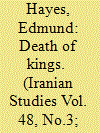

|
|
|
|
|
| Summary/Abstract |
Ferdowsi's Shahnameh was not conceived as a national epic, but it does encapsulate another kind of group identity: it provides context and meaning for the glorious pedigree of the Iranian aristocracy. Ferdowsi himself was a member of the Khorasani dehqān gentry whose collective effort in the tenth century CE was turned towards preserving and reshaping their own history and literary heritage in the terms of the new era. This article analyzes the final section of the Shahnameh, dealing with the reign and death of the last Sasanian king, Yazdegerd III. As such, this section provides crucial clues for the function of the Shahnameh as a means to construct meaning for Ferdowsi's own group in his own time. The description of this crucial moment in history, pivoting between the era of Iranian kingship and the Islamic era, suggested possible modes for interpreting the present. The study reads this section of the Shahnameh with close attention to the use of the word nezhād (“lineage”), which circumscribes the identity of both the aristocrats of Ferdowsi's present, and the kings and heroes of the mythic past. In doing so, the transition between eras appears as a tragedy of nezhād, as the Sasanian dynasty is extinguished, raising permanent existential ambiguities for the entire class of Iranian gentry whose genealogies were associated with it.
|
|
|
|
|
|
|
|
|
|
|
|
|
|
|
|
| 3 |
ID:
184810
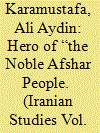

|
|
|
|
|
| Summary/Abstract |
This essay examines Nader Shah Afshar's attempts to legitimize his rule by dint of his Turkic background. Over the course of his rise to power and reign, Nader consistently argued that his Afshar and Turkman affiliations granted him the right to rule over Iranian territory as an equal to his Ottoman, Mughal, and Central Asian contemporaries. Aided by his chief secretary and court historian, Mīrzā Mahdī Astarābādī, Nader's assertions paralleled those found in popular narratives about the history of Oghuz Turks in Islamic lands. This element of Nader's political identity is often overlooked by historians because it did not outlive the brief Afsharid period, but it demonstrates how the Safavid collapse led to the circulation of dynamic new claims to Iranian and Islamic political power.
|
|
|
|
|
|
|
|
|
|
|
|
|
|
|
|
| 4 |
ID:
162543
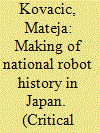

|
|
|
|
|
| Summary/Abstract |
This paper contributes a genealogical perspective to the social sciences study of robots in Japan, proposing a widely applicable research on “robot cultures.” The author discusses the corporate and governmental strategies and mechanisms that are shaping a national robot culture through establishing robot “lineages” and a national robot history which can have significant implications for both humans and robots. The paper contributes discussions on monozukuri (manufacturing) and Nihonjinron (theories on “Japaneseness”) to the existing anthropological consideration of robots, by examining links between monozukuri and robots, robot genealogy, popular culture and robots, and different social rituals and sites that help the enculturation of robots. The paper draws attention to the power relations and hegemonies of robot culture which also imply the existence of plurality and diversity that will require further scholarly attention as the robot phenomenon unfolds.
|
|
|
|
|
|
|
|
|
|
|
|
|
|
|
|
| 5 |
ID:
187869
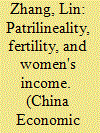

|
|
|
|
|
| Summary/Abstract |
This study investigates how traditional patrilineal family institution influences women's income through fertility behavior by offering evidence from family lineage (zongzu) in China. We hypothesize that family with strong lineage—proxied by owning genealogy—has a negative effect on women's income through the son-targeting fertility behavior. Using a difference-in-differences strategy, this study confirms the hypothesis. Relative to the women whose first child is a son, the women marring into families owning genealogy indeed have more children and lower income, if their first child is a daughter. In contrast, such finding does not hold for the male sample. Preliminary evidence suggests that shorter work time can explain the findings.
|
|
|
|
|
|
|
|
|
|
|
|
|
|
|
|
| 6 |
ID:
104059
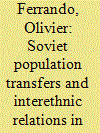

|
|
|
|
|
| Publication |
2011.
|
| Summary/Abstract |
This article explores a key event in the recent history of Central Asia: the 1950s Soviet policy of forced transfers of highlanders down to cotton kolkhozes in the Ferghana Valley. From both a historical and sociological perspective, the article analyses how the displaced population was received in the areas of destination. It sheds light on the concept of ethnicity, in the sense that these transfers were most often analysed in ethnic terms. This approach does not allow for the perception of a complex range of identities based on a nation, a region, a lineage, a religion or a language. The concept of ethnicity seems therefore limited to explain the social dynamics of nation-state formation in a region where identity appears to be multiple, changing and constantly renegotiated.
|
|
|
|
|
|
|
|
|
|
|
|
|
|
|
|
|
|
|
|
|